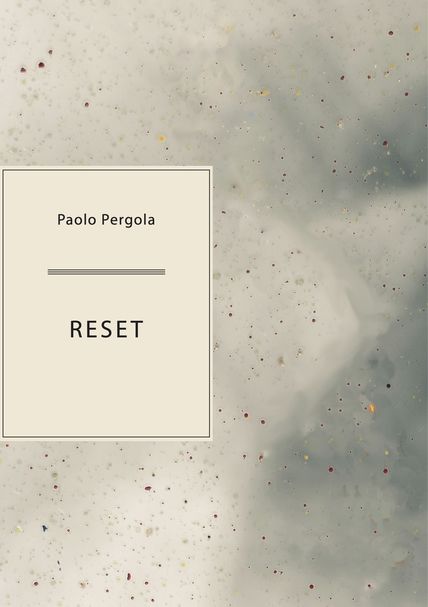
[Sagging Meniscus; 2021]
The narrative of mental health seems to operate largely in the psychological sphere of therapy or self-help. Or in the critique of social media that talks about how to behave in the depressing times governed by constant distractions. Both narratives are full of stories about devastations caused to sanity by negativity with only assumptions made about how one feels when caught up in the trap of everyday life. Retreats promise a “detox” that can help one put in touch with oneself with sessions or time away from gadgets.
It is surprising that very few works of fiction come to mind about mental health and detox—the stuff of wanted and sometimes even unwanted conversations about what to do with one’s life that seems so overtaken by everyone or everything around us. Indeed, where are the novels zooming into the mind of characters who find themselves entangled in the lives of others to the point of existing on an autopilot of sorts?
Enter Reset by Paolo Pergola, the story of a man, Lapo Pardini, recovering in a hospital after a serious accident. The only bones that remain intact in his body are his nose and his left hand. The novel opens three months into his hospitalization, with an interaction between him and his doctor regarding the possibility of a brain transplant because his is, well, too full and he would like an empty one. That’s the part that a reader may nod to: This is going to be a story about the mind and the (im)possibilities of “resetting” it. But Pergola’s writing keeps it sounding easy and light, explaining later:
My only hope would be a brain transplant, with a brain that is empty though. I couldn’t care less for a full or an almost-full brain. Not even half full. It should be an empty brain, and then I would be very careful not to fill it.
Because I was doing quite well when I was completely empty inside. I looked at people and they all looked the same. I wasn’t even wondering, Is this guy here, lying on a bed next to mine, one of my old friends? As it turned out, that was the Marshal. Then my memory came back to me, and I recognized my family, my friends, and those I didn’t recognize it was because I didn’t know them. I can understand. But couldn’t it be that experience gives you a wrong image of things around you?
Pardini, a biologist, contemplates life and begins to see it afresh, especially as he has lived through a time when everything was unknown to him because of the accident — when he sees his wife as a woman who came to see him and held his hand. As he remembers everything, he recognises everything that was and is wrong with the world. There is his parasitic colleague Malvezzi, the one who doesn’t work but jumps in to take the credit for everything:
Malvezzi, that man, is a threat to society. I remember the feeling of anguish when I was at work and he used to come into my office without knocking. I remember this very well. I remember that as soon as he came into the office, my cells, not only my liver cells and my neurons, but all of them, even the epithelial ones lining the intestine, all my cells started to secrete bile. I felt like shrinking while he placed himself right there, in front of me, and there was no way to kick him out.
Sounds hyper-exaggerated, of course, but only as an isolated excerpt. When seen in the context of the whole novel, one appreciates the understatement of Pardini’s observations. For instance, one smirks at his observation that Malvezzi would never do anything unless the human race goes extinct. As memories come back to him randomly and mostly in the form of images, he dwells upon the possibilities of everything profound. In one moment, he says that doing nothing is also a glorious thing to do. But nobody around him has made peace with the idea of doing nothing. We have the vocabulary that describes the constant state of doing. That’s why a reset, the idea of becoming empty or doing nothing, is unimaginable. There is no vocabulary to describe the point of doing nothing, or doing nothing except take antibiotics! At another point, Pardini gives a lesson in mindfulness:
Now that I’m stuck here, I’ve discovered the power of thinking, the beauty of thinking. I play with all the memories that emerge together, I pick one up and I look at it carefully, I turn it over and over, I remember it, I tell it to myself, and then I take another one and so on, I never get bored, I don’t need to move around.
Thinking brings him to toying with ideas such as making a movie with the title “Closed Today” for the thrill of being advertised with the theater name: “Ariston: Closed Today.” Or he would write a book called “No Title Found,” which people may never buy because it would be difficult to trace.
Pardini does not want any memories and thinks one must store them elsewhere. If one feels like visiting someone, one could also visit their memories. Similar to this technological solution is his idea of living life as a game. One can always start afresh after having died several times. It sounds like the idea of re-routing whenever one is lost while using Google Maps or something.
One day he waits for one of the nurses to visit him but she does not turn up. Pardini thinks the doctor has got something to do with it:
That doctor Broglia is one step ahead of the devil, he must have invented a very complicated algorithm for establishing the night shifts.
Such observations are mild and mildly funny. As one reads such moments of reflection, one wonders, is the act or state of “reset” inherently funny or morose or both? Perhaps all reflection is funny. Perhaps all philosophy is funny! Like his response to the idea of “eat, pray, love”: according to him, this is better replaced by “eat, sleep, take a shit.” If one could really get this close to reality in the sense of being a purely biological being, reality would get surreal. That’s one reason why taking a shit, Pardini recalls, is a moment in one of the films made by Luis Buñuel, the surrealist.

Reset, the state, is funny except when it is scary—like the legend of the scorpion that Pardini shares. Surrounded by fire in sand, the scorpion stings itself and ends its own life, as the boys who trap it stand and watch.
Aside from the use of humor and interweaving of technological metaphors, Pergola’s work is at its most curious for what it does to the claims of polyphony for the genre of the novel. Ever since twentieth century Russian Formalist Mikhail Bakhtin wrote about polyphony, the genre of the novel has come to be identified as unique for its ability to express multiple voices in contrast to the singular authorial voice of the lyric. Pergola’s craft does include multiple voices but they flow in one voice—that of Pardini. Here is one example:
What do you want to modify, Corrado, you know how things work at the ministry, so it’s fine as it is, at best you could change the modeling a little. Change how? Just forget the mathematical model of the fish that go up and down with the metabolic functions and the fourth-degree equations and all that stuff. But then what do we put in there, Malvezzi asked, the predictive mathematical models are important otherwise the ministry will tell us that the project has no implications for management and so on and so forth.
Conversations are not identified as conversations with the help of quotation marks or set aside in paragraphs. They flow as one person’s narrative. Pardini narrates the conversation the way he hears it. For instance, he says that his mother puts question marks when she doesn’t expect answers and gets confused when someone responds to such a question, mistaking it to be something that deserves an answer.
Reset is about the desire “to stop doing” and the want “to think, to remember,” to visit memories as fresh, unused memories. We talk automatically, as Pardini observes about one of the people around him. One cannot help but think that we are already machines, but it never occurs to us to go on a reset mode at all. The novel is a pleasure to read: As an invitation into a character’s mind about learning to untangle himself, it is an invitation to go deeper into one’s own mind. One will recognize most characters from one’s own life reflected in Pardini’s narration: an evil colleague, bothersome spouses, mothers who won’t leave one alone, beloveds who are yet to be told they are or were beloveds, and kids who totally “get” the idea of looking at the world in a simple, straightforward way and as people with whom one can have sane conversations.
Soni Wadhwa teaches English at SRM University, Andhra Pradesh in India. She is a regular contributor to Asian Review of Books and tweets at @SindhuJournal.
This post may contain affiliate links.







